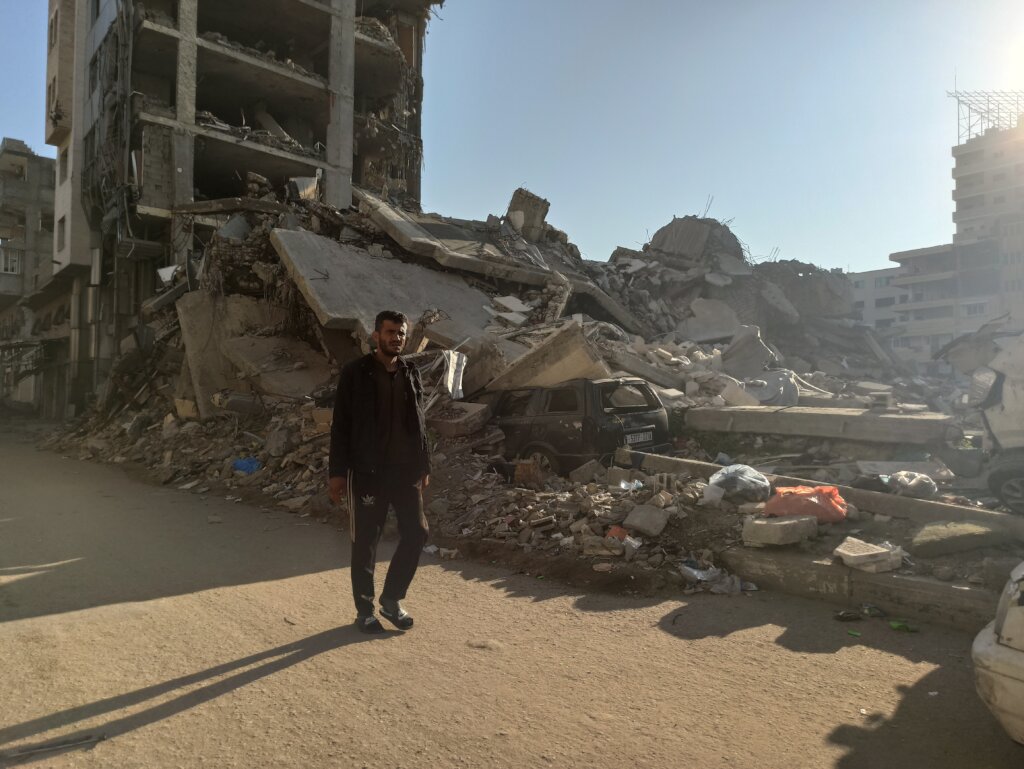By Kat Grimmett | Staff Writer
Before the war, thanks to the generosity of our supporters, Rebuilding Alliance was assisting 16 individuals in Gaza with small-scale farming of vegetables and fruits and raising livestock, such as goats and chickens. This unique program, called Goats and Gardens, helped families achieve a sustainable income despite harsh economic conditions.
Fortunately, we are still in contact with four recipients of the Gardens and Goats program: Shireen, Ameera, Aqela, and Abeer. This is with great thanks to the connections of Mrs. Najah, the Executive Director of the Women Programs Center, our long-standing CBO partner and friend in Gaza, and Kareem Nasrallah. It is a deep relief to learn that Shireen, one of the most successful Gardens and Goats recipients, has returned to her home—the same shelter where she first started. Her house is still standing– a miracle considering over 80 percent of residential buildings have been destroyed.
There is word that people in Gaza have begun to garden in areas clear of rubble and debris. According to Mrs.Najah: “there are some seasonal crops such as tomatoes, cucumbers, spinach, molokhia, cabbage, and cauliflower, which help meet part of the community’s vegetable needs. However, these crops are scarce, expensive, and insufficient due to the high cost of cultivation, especially in the absence of essential agricultural supplies like fertilizers and seeds.”
One of the most pressing goals for this program moving forward is soil remediation. The soil in dozens of areas across the Gaza Strip needs to be tested to ensure safe growing conditions before launching any farming initiatives. As a result of the bombardments and chemicals used in warfare, we must test for heavy metals, PFAOS, and other contaminants. This must be in collaboration with existing entities like the World Health Organization. We already know that the Palestine Institute of Biodiversity and Sustainability is seeking soil tests, but the total blockade restricts items like food and shelter, much less agricultural resources.
Mrs.Najah offered her advice on the arduous task of remediation post-war: “It is crucial to choose planting areas, rubble must be cleared first and the lands must be clear of contamination caused by explosives, which could render the soil unsuitable for farming. For now, we must wait and hope that the war will come to an end, bringing peace and safety back. When that happens, these women will return to their work, ready to rebuild and recover what they have lost. They will need everything to start from scratch, but this time, they have the experience and resilience to make their projects even more successful.”
Amidst these challenges, Rebuilding Alliance is determined to make a difference in the lives of the people of Gaza.
Currently, our kitchens with ‘By the Hands of Your People’ are serving nearly 40,000 hot meals every day to displaced Gazans. The need is immense. To find a sustainable solution, we must seek to empower Palestinian families to cultivate their land.
Project reports on GlobalGiving are posted directly to globalgiving.org by Project Leaders as they are completed, generally every 3-4 months. To protect the integrity of these documents, GlobalGiving does not alter them; therefore you may find some language or formatting issues.
If you donate to this project or have donated to this project, you can receive an email when this project posts a report. You can also subscribe for reports without donating.
Support this important cause by creating a personalized fundraising page.
Start a Fundraiser